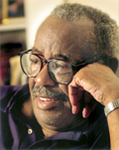|
The Road of Fate
and Miracles in
“Keeping the Faith With Morrie,” a 30-Minute
Documentary
Bludogbiz recently spoke with Angel Harper,
the executive producer of, “Keeping the
Faith With Morrie,” about her award-winning
30-minute documentary. The film salutes the
pioneering life of the first
African-American syndicated cartoonist,
Morrie Turner.
Heaven
Sent Productions debuted the documentary at
the 2001 Parable (In His Presence) Christian
Film Festival. On June 11, 2001, Ashley
Rogers (Writer/Director) won for Best
Director - Documentary at the awards
ceremony held at the Director’s Guild
America in Los Angeles, California. Then in
February 2002, at the Hollywood Black Film
Festival, in Los Angeles, Angel Harper
received an award for Best Documentary.
As
Bludogbiz got to know Ms. Harper more, they
learned that she is a born-again Christian
and believes in “helping others.” So it was
no coincidence that we meet at Theatre West
in North Hollywood, California, where the
actor was volunteering for the day.
BDbiz:
In your film, we learn that young Morrie
Turner lived through the Great Depression,
and served our country during World War II,
where he also drew cartoons for military
newspapers. He later did the same as a
police clerk. How did you learn about
Morrie Turner?
Angel:
Quite, by accident. I think it was 1991,
when I first met Morrie. I was doing
animation voice-over work and learned about
Morrie’s Wee Pals cartoon strip. I hadn’t
heard of the cartoon before. Wee Pals, I
learned, was the first, multi-ethnic,
syndicated cartoon strip in America. Morrie
created Wee Pals back in the ‘60’s. Its
theme was tolerance and in it there were
kids of all races, gender, and physical
disabilities who formed the “Rainbow Club.”
Then in the ‘70’s, Michael Eisner, who was
then at ABC, put the comic strip in an
animated network television series called
“Kid Power.” I called Morrie after someone
gave me his telephone number. I wanted to
know more about him, and I also had selfish
reasons.
BDbiz:
What did Morrie have to say?
Angel:
I told him who I was and him how much I had
admired his work. We spoke about his
cartoons and what he was doing. Then
somehow, he turned the table on me and got
me to talk about myself. I admitted a lot
of things to him, which I usually don’t do.
But that’s Morrie--he somehow gets you
feeling so comfortable that you open up to
him. We spoke for quite sometime. At the
end, Morrie said, “You just keep the
faith.” And that statement stuck in my mind
over the years.
BDbiz:
So about tens years went by before you made
the documentary. What were you doing
between then?
Angel:
I had moved to Los Angeles. I had hopes like
all actors: to have my own TV series, then
to do feature films, and then to produce,
which was my major in college. l graduated
from Cornell University with a Bachelor of
Science degree in Radio and Television
Production. But even while keeping busy
appearing in soap-operas, sit-coms,
television dramas, films, and doing
voice-over work, I had Morrie in the back of
my mind. I had stayed in touch with him
over the years. Several projects that I had
tried to put together involving Morrie fell
through for one reason or another.
Throughout the years, after I first had met
Morrie Turner (by telephone only), I always
thought I would like to do something
involving Morrie.
BDbiz:
So let’s fast forward to the year 2000.
What happened next?
Angel:
“God works in mysterious ways.” Looking
back, “I believe I was destined to do this.”
I had volunteered to help with the Parable
Christian Film Festival in 2000. That year
I helped other people at my church realize
their dreams of making their films. That
experience made me believe that I too could
make a film. At the time, I was working on
starring in a feature film. I had also been
actively involved in Women in Animation’s
Voice-Over Committee. At first, I thought
of my Morrie project as an animated TV
pilot, which I could involve the Voice-Over
Committee, and then enter in the Parable
Christian Film Festival.
BDbiz:
How did it evolve from an animated short
into a documentary?
Angel:
I was working on both the feature film and
Morrie’s animation project. Then someone
asked me if I had read the film festival’s
application. The reason was that you
couldn’t do animation for the festival. I
then looked at the application and saw that
they accepted documentaries. So I decided
to do a documentary on Morrie Turner and put
the comic strip in it. The documentary was
to promote Morrie Turner.
BDbiz:
How long did it take you make the
documentary? And how much did it cost?
Angel:
The making of the documentary just proved to
me how God works. By now, the feature film
deal had fizzled. But the minute I decided
to do the documentary—it just took off! A
series of miracles occurred--they truly did
since we had virtually “no- budget.”
Everyone who worked on this film volunteered
to do it. With that kind of commitment, and
with a story like Morrie’s, you can’t help
but succeed. First, Ashley Rogers signed on
as writer/director. Her boyfriend, Mark
Milkin, a professional cameraman then signed
on as the Director of Photography. They
secured the Sound Engineer, Michael Young.
Sherry King from the WIA Voice-Over
committee added her talents and became the
Associate Producer, and coordinated the
interviews. Sherry got Sally Banter to
agree to be our Editor. We now had a great
professional team. That’s totally God! And
with such talent and commitment, we took
nine months from development to entering the
documentary in the 2001 Parable Christian
Film Festival. Now that I’m learning more
about documentaries, I realize how fast we
made our film. I now know that some people
take years to make theirs because they do it
in their spare time and mostly with their
own money.
BDbiz:
That’s pretty remarkable--to get the
documentary made in nine months. But did
you run into any technical difficulties
along the way?
Angel:
We had our share of difficulties, but also
miracles. The making of this documentary
was an act of faith for each and every one
of the team members. The height of such
miracles was going to San Francisco for a
four-day shoot. We had no money for airline
tickets, hotels, or a rental car. Ashley,
the director, called me two weeks before our
scheduled date and asked me whether we were
still going? That night I could not sleep.
I had already called several airlines to ask
for a corporate donation. They all said
they would need at least six weeks to
process such a request. I then remembered
that a Cornell alumni, whom I had meet at a
recent, alumni event, was a pilot. So at
three or four o’clock in the morning, I got
up and started looking for his business
card. Guess, what? It took just five
minutes to find it. The next day, I called
him and politely asked him, a person whom I
knew only as an alumnus, for a donation from
his airline. He not only remembered me, but
also said he would ask and call me back. I
didn’t expect him to call back. He did, but
said the airline needed six to eight weeks
to process my request. He then said he
would ask his pilot-friends at sister
airlines. Again, I thought he was just
being polite and thanked him. But you know
he called back the next day. Again, he said
the other airlines said the same thing. I
thanked him and was about to hang up. He
said, but wait. He then said he’d pay for
it. He asked if we would mind going on
Southwest Airlines? I said, it’s no
problem. The next day, he emailed me the
e-tickets. I then told the director. She
was so inspired that she later called Budget
Rent-A-Car to ask them to donate a rental
car. To her surprise, they said, yes. We
then arranged to stay with friends so we
were now set for our San Francisco trip.
BDbiz:
You announced at the Hollywood Black Film
Festival that you secured fiscal financing
to extend the documentary to an hour. What
will your goal be in extending it?
Angel:
First of all, fiscal sponsorship means that
we now qualify as a nonprofit Section 503(c)
organization [under the Internal Revenue
Code]. I’m hoping to raise $100,000 for the
budget. But with our nonprofit status, we
can now give volunteers a charitable
write-off, which they can use as a tax
deduction. As far as my goal, it is to make
the 60-minute version not only about Morrie
Turner’s life, but also about how the
history of comic strips and how Morrie
integrated the cartoon strips with people of
color. So it will also be about the
industry before Morrie and after Morrie.
BDbiz:
What are your plans for the documentary?
Angel:
I’m hoping to distribute it to schools and
libraries to educate kids about Morrie
Turner’s groundbreaking life, place in the
history of comic strips, and lifetime
commitment to teaching “tolerance,” and
“humanity.”
**********
Morrie
Turner’s work on the Kid Power network
series not only gained him a wider audience,
but also helped him earn the prestigious
“Sparky Award,” named for his friend and
mentor, Charles “Sparky” Schultz, the
creator of the world renown “Peanuts” comic
strip. It is one of many awards he has
received over the years. To read more about
Morrie Turner, you can begin at the most
popular website listed for him on the Google
search engine, by clicking HERE, or on his
name in the article!
Angel
Harper, in addition to being an actor and an
award-winning voice-over performer, is also
comedian, a winner of America’s Funniest
People, and has appeared on BET’s Comic
View and Show Me the Funny. Ms.
Harper’s talents also extend to the printed
word. She has written a book, Master the
Art of Cold Reading, published by Heaven
Sent Publishing available at Barnes & Noble
or Samuel French Bookshop. She is also the
entertainment health-reporter for
Behealthylifestyles.com where she writes
about the latest health tips for actors and
where she will be a movie critic for the
column, “Eyes on the Movies.” To read more
about Angel Harper’s documentary click
HERE.
Bludogbiz wishes Ms. Harper all the best and
will be there to see her 60-minute
documentary, which will remain appropriately
entitled, “Keeping the Faith With Morrie.”
|









